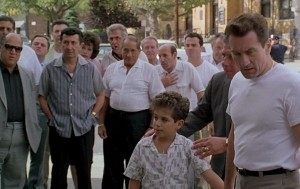The 1990s seemed a veritable breeding ground for mafia-based films, especially ones starring Robert De Niro. And while there is a ceratin infamy left by characters portrayed by De Niro, such as Frank Rosenthal (“Casino,” 1995) or Jimmy Conway (“Goodfellas,” 1990), the comforting fact about 1993’s “A Bronx Tale,” De Niro’s directorial debut, is that De Niro is content to fade into the background and let the story tell itself. “A Bronx Tale” is less about the mafia but about more about a boy growing up in the Bronx under the fathering of two figures – one, a hard-working blue-collar dad, and the other a vicious mobster feared on the street. The result is powerful, showing the trials, tribulations, and race relations that lined New York during the 1960s.
At the film’s onset we see the focal point for the story as nine-year-old Calogero Anella (Francis Capra) rides with his father Lorenzo (Robert De Niro) as he completes his daily bus route, pounding out an earnest living. The bond between father and son is clear; however, Calogero fights an ever-growing interest in the patrons of a bar down the street, most specifically the mobster Sonny LoSpecchio (Chazz Palminteri, credited with writing the play for “A Bronx Tale”), who is the enigma of mystery and class to young Calogero. “The saddest thing in life is wasted talent,” Lorenzo teaches his son, speaking in general about failure but maybe specifically about people like Sonny. But Calogero is drawn to Sonny, and by the time he sees Sonny shoot a man in the street and refuses to rat him out to the cops, a bond between Sonny and young Calogero is formed that Lorenzo finds impossible to break.

The base strength of “A Bronx Tale” is that it has a small and manageable focus, training its spotlight on Calogero as he grows up under these two men, and doesn’t attempt to glamorize the dealings of the mafia or blue-collar work. It’s clear that Lorenzo detests Sonny’s existence; but if he does detest it, it goes more toward his upbringing, and a set of unflappable morals, than it does on his actual dislike of the man. Two scenes, one, as he makes his son give back $500 given to him by Sonny after helping him win a craps game, and another as Lorenzo warns him to stay away from his son show this well. The importance of “A Bronx Tale,” it seems, is that Sonny also understands this and respects it. While a group of street punks in a bar are savagely beat up for disrespecting Sonny’s neighborhood, Lorenzo is repeatedly spared by the gangster, underlying an understanding of Lorenzo’s lot that Sonny clearly has.
“A Bronx Tale” also makes several commentaries on the close knit neighborhoods that lined 1960’s Bronx, as well as the violence that underscored some of its rougher neighborhoods. As Calogero grows up (played excellently by “Crimson Tide’s” Lillo Branacato), his friends are content to sit around the streets hurling racial epithets at black kids on their way to school, while Calogero’s not really sure he feels the same. Calogero’s interest in a black girl from his school (Taral Hicks, “Belly”) furthers this divide, and it is here the movie casts some interesting parallels on Calogero’s two parents. While Sonny encourages the relationship (even going so far as to loan him his own car for their first date), it is clear Lorenzo does not feel the same. “What if I were to be interested in a black girl,” Calogero tests in a cautious scene. “I know that you would never do that,” Lorenzo retorts.
The acting of “A Bronx Tale” is excellent, featuring powerful performances by all involved. De Niro’s greatest achievement here is that he is able to slink into the background and let most of the movie’s telling be done at the hands of Palminteri and Brancato. Scenes where he instructs his son throughout are poignant, and the love Lorenzo has for his son are aptly clear. Likewise, Palminteri does a superb job fleshing out the mobster Sonny in bright colors. Possibly a vicious man, but also a considerate one, Sonny has a clear bond with young Calogero that only flourishes under the performance of Palminteri. It’s hard to imagine the movie the same without him. Last but not least, Brancato is excellent as Calogero, and possibly the greatest regret here is that we haven’t heard much from him since. Under the wings of powerhouses like De Niro and Palminteri, the character of Calogero ran the risk of fading into the background; however, in Brancato’s hands, he instead becomes the driving force for the entire movie.
“A Bronx Tale” is a good movie. While certainly slow-paced, it is captivating nonetheless and will reward patient viewers. Amidst a plethora of movies that glamorize mob life, the film shines its light on the farther reaching issues affecting the life of a youth growing up in the Bronx while showing the ups and downs of both the rough and tumble street life and blue collar existence. The decisions we make while growing up can have lasting effects. The strength of “A Bronx Tale” is that it knows this, embraces it, and offers food for thought on both sides of the coin. An excellent movie and a definite recommend.
– By Mark Ziobro